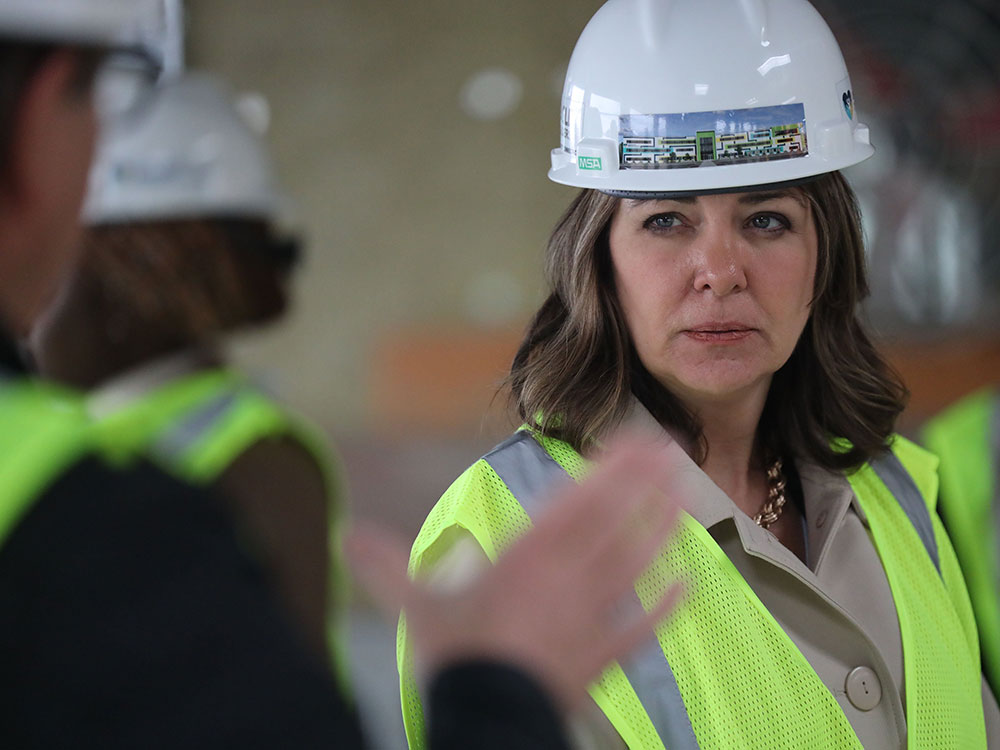“History shows it’s downhill from here for NDP,” the Edmonton Sun trumpeted in a post-election headline. “The lesson is 2023 is the best the NDP will ever do. The next step for them is shrinking support, not government.”
Columnist Lorne Gunter’s argument only shows how many Alberta conservatives remain mental prisoners to the halcyon days of explosive oilsands investment, labour shortages and a working class too flush with cash to give a whit about political discourse.
It is true that a weak economy and ballooning deficits in the late ’80s and early ’90s caused a flash of public discontent toward Alberta’s Progressive Conservative government under Don Getty. But as economic fortunes rapidly improved, so did the outlook for Ralph Klein and the PC dynasty. The rest is history.
Alberta’s political landscape today is fundamentally different from the one ruled by the Progressive Conservatives for 44 years, including that one time Alberta Liberals swept Edmonton and won 32 seats. Even Gunter acknowledges the difference, while somehow failing to grasp its significance: “The Liberals won four seats in Calgary (a lot at the time), but the Notley NDP won 14.”
Exactly. In Alberta the three pillars are the rural vote, Calgary and Edmonton. One needs two of three to win elections. The PC party achieved dynastic status by dominating Calgary and maintaining a consistent competitive edge in rural Alberta. And for much of this time Alberta could sustain multiple conservative parties without the Progressive Conservatives breaking a sweat come election day.
The 2015 ascension of Rachel Notley to power blew all assumptions about Albertan conservatism to smithereens. No longer could the Conservatives and splinter parties like the Wildrose party compete over the same voters; the pool wasn’t large enough to do so and win.
Enter the United Conservative Party, designed to resuscitate the winning Calgary-rural coalition from years past. And it worked for one cycle under Jason Kenney, until the fissures within this shaky coalition swallowed his career whole.
The UCP is nothing but the last gasp of yesterday’s Alberta, and they should enjoy their 2023 win as one does their final breath. By now it should be apparent that the only thing working for this party is the claim to be a big-C comfort brand that is rapidly losing its lustre.
This is a governing party that rode high in the glory of record oil and gas prices, ubiquitous anti-Trudeau sentiments, a leaders’ debate victory and only faced an amateurish, one-note NDP campaign with major blunders on taxes as resistance. The spin about UCP Leader Danielle Smith being an electoral liability is absurd; indeed, she is the only one who could have led the UCP to a win according to exit polls.
All of these tailwinds and yet, after one term of government, the UCP lost half of Calgary. And in 2027 they’ll lose the other half.
After all, the UCP’s favourite piñata in Ottawa won’t be around forever. Urban representation will grow with electoral redistribution ahead of the next election. And it must also be acknowledged that Calgary, like Edmonton, has delivered landslide victories to progressive mayors in four straight municipal elections. Calgary is on track to be 10 per cent less white by the next election than it was during the last census, and it’s already the third most diverse city in Canada. The economy is changing and the moneyed class has recognized there is more than one horse on which to hitch their chariots.
Predominately rural parties like the UCP have almost never found sustained electoral success in any city in North America, including liberal Houston and Denver. Calgary will not be the exception. There is simply not enough agreement between city and country on social values or big picture economic direction to allow one party to win over the same voters, which is why the PC party cracked open in the first place.
What we’re seeing happen to the UCP in Alberta is the reverse of what happened to the NDP in Saskatchewan. The Saskatchewan NDP dominated provincial politics for decades with an antique coalition of agricultural producers and the urban workforce of Crown corporations.
But once the agricultural vote slipped, nothing could stop the full-blown uncorking of the spigot. In their final days of government, the Saskatchewan NDP clung to power through an alliance with Liberals, but as soon as they were replaced by the right-wing Saskatchewan Party, the process was complete. So long as the countryside has a stranglehold on the balance of power, it’s hard to imagine the NDP winning Saskatchewan ever again.
But in Alberta, that balance of power squarely rests with the cities. And now that the UCP’s urban vote has faltered, nothing will put the spigot back in the cask. Calgary and Edmonton will vote together provincially, as they already do municipally. By then it’s over.
Danielle Smith is now the last barricade between the progression of a modern, cosmopolitan Calgary and the demise of conservatism in Alberta. Gunter expects her to hold fast by maturing and “governing sensibly.” Never mind her reams of asinine statements about Nazis, border blockades, cancer and Putin, this is a leader who once thought it wise to defect from her own Wildrose party, which spectacularly backfired months later when the NDP was handed its first provincial government.
Imagine the callousness Smith must have summoned to bypass all conventions around merging parties, and instead stab in the back all those voters who had elevated her career to new heights. And go figure what’s worse: Smith stabbing her own voters in the back, or those same voters handing her the knife back, their gashes barely scabbed over.
They must really hate themselves to do such a thing, which is fitting for a demographic whom we already know hate abortion, hate trans kids, hate doctors, hate Justin Trudeau and even hate Jason Kenney. The rest of us might not have minded when Smith’s voters were her only marks; now it is the whole province subject to her self-indulgent decision-making and impulse to use our money to pay back friends in high places. We’re all her marks now.
Although tax giveaways to former clients and mass privatization of public services is unsettling, it is not a strategy to win urban votes.
Pull out a lawn chair this summer and bask in the salubrious twilight of Alberta’s conservative rule. With Danielle Smith as the last barricade, the UCP promises to blink out with a bang and not a whimper. ![]()

















Tyee Commenting Guidelines
Comments that violate guidelines risk being deleted, and violations may result in a temporary or permanent user ban. Maintain the spirit of good conversation to stay in the discussion and be patient with moderators. Comments are reviewed regularly but not in real time.
Do:
Do not: